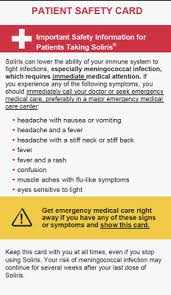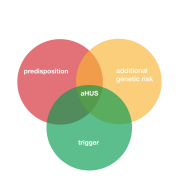The portrayal of rare diseases in the media can be both positive and detrimental. It can be sensational and political. It can be frequently inaccurate and misleading. Journalists are switching from topic to topic each day. They cannot be expert or take in all they write about. They also need to seek attention.
Below is the headline of an article in a British newspaper about ravulizumab. The subject of the article is woman with PNH. Full article available HERE if local laws permit.
Woman, 31, drained of energy because of her rare blood condition hails ‘superwoman juice’ for changing her life after NHS bosses approved new £300,000 drug
- Jess Ratcliffe was diagnosed with PNH, which destroys red blood cells
- She said new treatment that slashed treatment frequency is ‘superwoman juice’
- The drug, which costs £300,000 per patient per year, is given six times annually
Perhaps the most noticeable comment is that ravulizumab is described as “superwoman juice”. The article is about one woman who used those words, apparently, to describe Ravulizumab.
The article acknowledges that are around 600 to 800 PNH patients who could benefit.
The reason given that the patient feels she is a “superwoman” is because her treatment frequency has reduced to six times per year from 26 times..
The article explains ,confusingly, that her previous treatments of both eculizumab and blood transfusions were given every two weeks. The patient was diagnosed with PNH in 2016. She had been misdiagnosed for some time before that. It could be the transfusions relate to that.
Or it could be at that at the previous dosing levels eculizumab was proving to be not as effective for her. Higher doses were needed to prevent breakthrough haemolysis and an “iron deficiency” secondary to it to raise energy.
Unlike for aHUS, where eculizumab doses were always higher, Ravulizumab dosing levels are now higher for PNH patients. PNH patients get a double quality of life benefit. Firstly from higher clinical effectiveness and then from less frequent infusions. It was a part of the case made to health policy makers.
The journalist emphasises the less frequent treatment needed. This means the woman will now have normal energy levels for seven weeks compared with 10 days on eculizumab. Hence she feels like a “superwoman”.
Or in reality more normal.
The article correctly states the rarity of the disease. PNH patient numbers though are much higher than for aHUS patients treated in the UK.
In King’s College Hospital ,London alone , (one of two PNH specialist centres in England, the other being in Leeds) there are 360 patients are being treated for PNH, , 80 of these patients are reported as receiving Ravulizumab. Apparently the rest, according to the article, are participating in clinical trials!
If so they would be at no cost to the health service and paid for by Pharma.
There is a clinical description of PNH. It was provided by the expert centre. It explains that it is the patient’s immune system that destroys the red read blood cells but not why the are destroyed but with no mention of Complement overactivation.
The £300,000 price tag reported is a guess. No one knows what price Alexion has agreed with the NHS, because it is a confidential patient access agreement. It will involve a discount on list price.
Inevitably these days comments from the general public are posted along with the online article. Not a lot at the time of writing, but over 100.
There were the usual kind of comments when it comes to health decisions about rare disease costs. “Greedy” Pharma with “incredulous”, “insane” prices for their products. And the “what about” other foregone treatments for many, just to give a woman normal energy levels. Resentment that their hard earned money is going to be spent on her, sometimes based on perceived social class due to where she is from or occupation. “Much better to spend the money on mental health, cancer, stroke or those with heart disease”.
At the moment inevitably there is some conflation with the COVID 19 impact on health service and the backlog of treatments for most non COVID patients. Commentators claim NHS is overburdened with such unaffordable costs when it “needs more doctors and nurses. One person suggested “Red Bull would help her energy levels and be cheaper, possibly to be humorous!
The comments show a lack of understanding of health funding decisions and reflect some prejudices.
There were some commentators who defended Pharma drug pricing when research and development is so expensive, in fact costing millions of pounds. More like billions! Some claim prices will fall over time as drugs could be used for other illnesses.
The article did not help understanding that ravulizumab was cheaper not more expensive than the current treatment. Some who read it were just pleased that she had been saved from a life threatening condition. Some thought those who objected would change their minds if it was their mother, daughter, sister or wife who needed it.
Over all more were against than for, sadly. Sometimes raising awareness has that effect.
NICE is an independent organisation which makes decisions on which health treatments are affordable in England. It is neither the “watchdog” nor “boss” of the NHS, which the article erroneously claims.
The cost savings per patient from ravulizumab for aHUS are considerably more than for PNH. The aHUS cost per patient is much less than the £300,000 high profile price used to challenge affordability. And cost per patient falls further when treatment is given when needed for as long as is needed. Evidence is mounting about the cost effectiveness of aHUS treatment.
In any affordability review, quality of life scoring is measured on a scale 0, low/death to 10, high. 10 does not mean someone is superhuman. Just in perfectly normal health. Normal health for most is below that.
The Global aHUS Patient Vision ( see Article 325) is.
When enough aHUS/cTMA awareness helps everyone in the world get affordable access to the right treatment they need to be cured and be normal,
it will be a good day.
Being normal is super enough for a good day.
Article No.467


